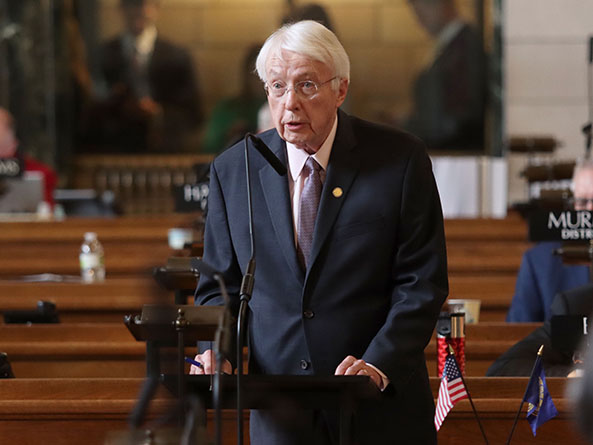Session Review: Business and Labor
Lawmakers approved an omnibus bill this session relating to the regulation of business and labor law in Nebraska.
LB191, as originally introduced by Hastings Sen. Steve Halloran, would have made certain workers’ compensation injury reports confidential for 60 days from the date of filing.
The bill was gutted by a Business and Labor Committee amendment on general file in order to replace it with provisions of a variety of measures heard by the committee.
Provisions of LB267, sponsored by Gordon Sen. Tom Brewer, prioritize resources such as personal protective equipment, vaccines and medical treatment for critical infrastructure utility workers during a civil defense emergency.
LB249, sponsored by Albion Sen. Tom Briese, adds the extension of sewer or water service as an eligible activity under the Rural Workforce Housing Investment Act.
The committee package also includes provisions of five other bills that make technical changes to existing law:
• LB427, sponsored by Ralston Sen. Merv Riepe, which amends the Nebraska Contractor Registration Act to no longer require out-of-state contractors to pay a one-time $25 registration fee or submit a $25 fee for each contract they receive of at least $10,000;
• LB460, sponsored by Omaha Sen. Mike McDonnell, which requires the state Department of Health and Human Services to reimburse first responders for examination costs related to mental health injuries that are not reimbursed by their employer and requires that rates be established by the Critical Incident Stress Management program;
• LB639, sponsored by Bellevue Sen. Carol Blood, which changes notice requirements on proposed workers’ compensation regulations and eliminates certain other hearing and summons requirements;
• LB666, also sponsored by Riepe, which amends the state Employment Security Law to allow employers to choose their preferred method of document delivery and extends the deadline for employers to submit voluntary contributions to the state Department of Labor from Jan. 10 to Feb. 28 each year; and
• LB671, sponsored by Blair Sen. Ben Hansen, which allows the Nebraska Training and Support Cash Fund to be used for employee retention for Nebraska businesses.
LB191 passed 46-0 and took effect immediately.
Two bills considered by the committee would make changes to the state’s minimum wage law.
LB15, introduced by Briese, would create a youth minimum wage and a youth training wage for certain new employees in Nebraska.
At the November 2022 general election, Nebraskans voted to increase the state minimum wage from $9 to $10.50 per hour on Jan. 1, 2023. The rate then increases incrementally until reaching $15 per hour on Jan. 1, 2026, and adjusts annually going forward based on the Consumer Price Index to account for cost-of-living increases.
LB15 would set the minimum wage for employees age 14 to 17 at $9 through 2023, increasing .25 cents per year until reaching $10 per hour in 2026.
The bill also would allow employers to pay new employees who are not seasonal or migrant workers between ages 18 and 20 a minimum training wage of $9.25 through 2024, increasing to $10 per hour through 2026. Beginning Jan. 1, 2027, the training wage would be 75 percent of the otherwise applicable minimum wage.
Another proposal would cap the upcoming annual cost-of-living increases to the state’s minimum wage.
LB327, introduced by Lincoln Sen. Jane Raybould, would increase the wage by the lesser of 1.5 percent or the CPU beginning Jan. 1, 2028.
Both bills were advanced to general file by the committee but were not scheduled for debate this session.


